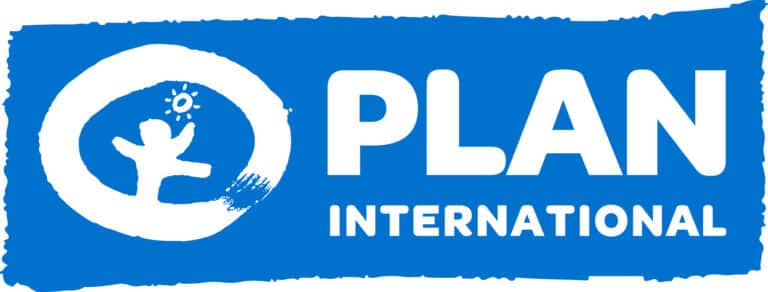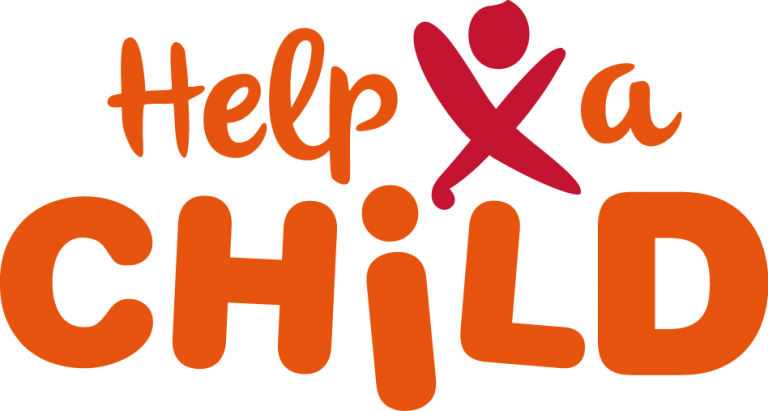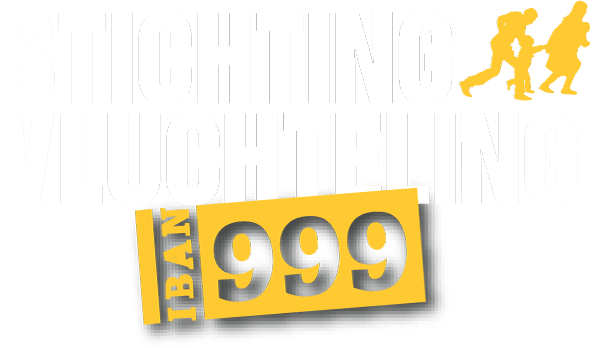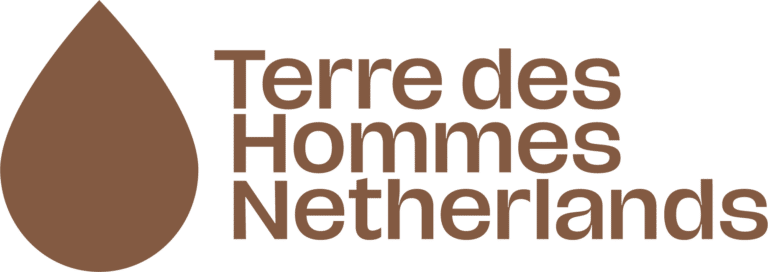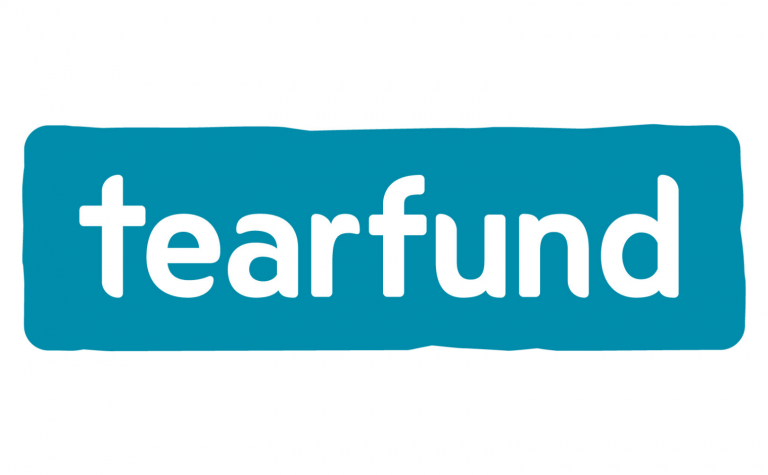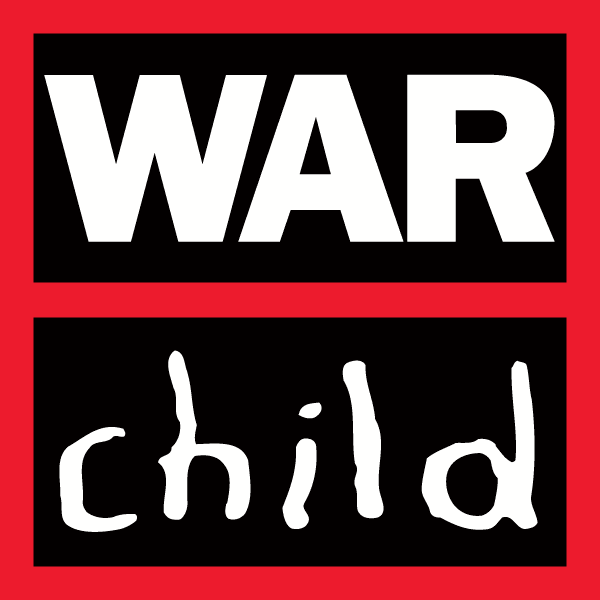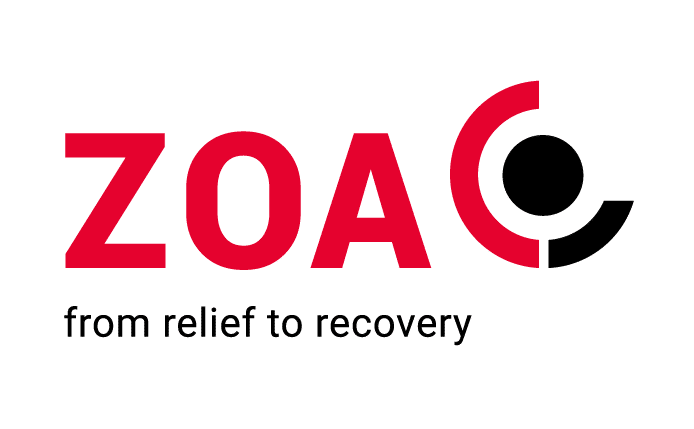
Faces of the Central African Republic
Photographer: Mickael Franci (Cordaid) | Writer: Frank van Lierde (Cordaid)
Photographer: Mickael Franci (Cordaid)
Writer: Frank van Lierde (Cordaid)
Since 2015, the Dutch Relief Alliance – through a Joint Response of ICCO Cooperation, Plan International, SOS Children’s Villages, Stichting Vluchteling and led by Cordaid, reached out to thousands of war-affected children and adults in the Central African Republic. We joined hands with Central African responders to provide shelter, protection, food and livelihood assistance, clean water and cash support. What follows is the story of some of the villagers and the responders in Ouham province. It’s a story of hope against all odds.
Wars tend to infest the most beautiful of countries. The Central African Republic is no exception. Zigzagging on bumpy dirt roads through the savannah of Ouham province is like driving through a catalogue of natural beauty. But every village and every hamlet is a pandora’s box full of harrowing stories.


“I have seen wars come and go. The worst one was the latest. I was working in the field when armed Seleka groups entered our community in 2013. We fled. For a year we stayed in a camp near the cathedral, with more than 10.000 others, packed together. First, we lived and slept in the open air. It was exhausting. The children couldn’t go to school. Life was hard. My wife died in the camp. Today, I am the sole caretaker of four of my grandchildren. Their parents died from illnesses after they fled northwards.
With the proceeds of my vegetable garden and some neighbour support, I manage to raise my grandchildren. They go to the child-friendly space here in Zoro, where they receive the care and education that I cannot give.
I’m not God, I don’t know if there will be other wars in the future. I can only pray there will be no more fighting.”
Jean Baptiste Ngaïndiro (79) – Some of his grandchildren go to the child-friendly space in Zoro
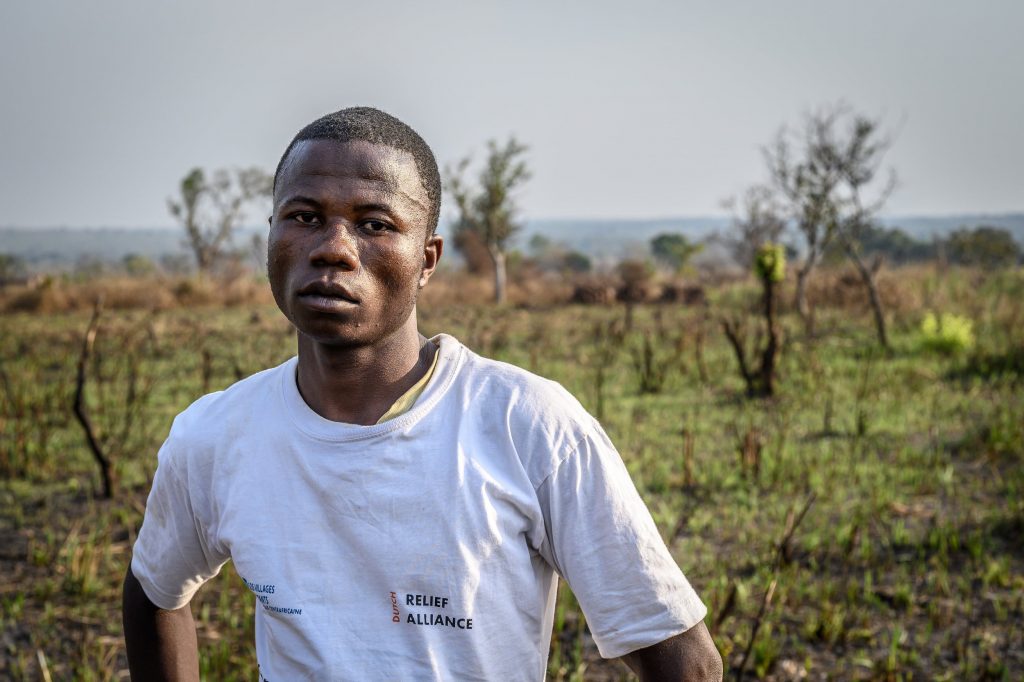
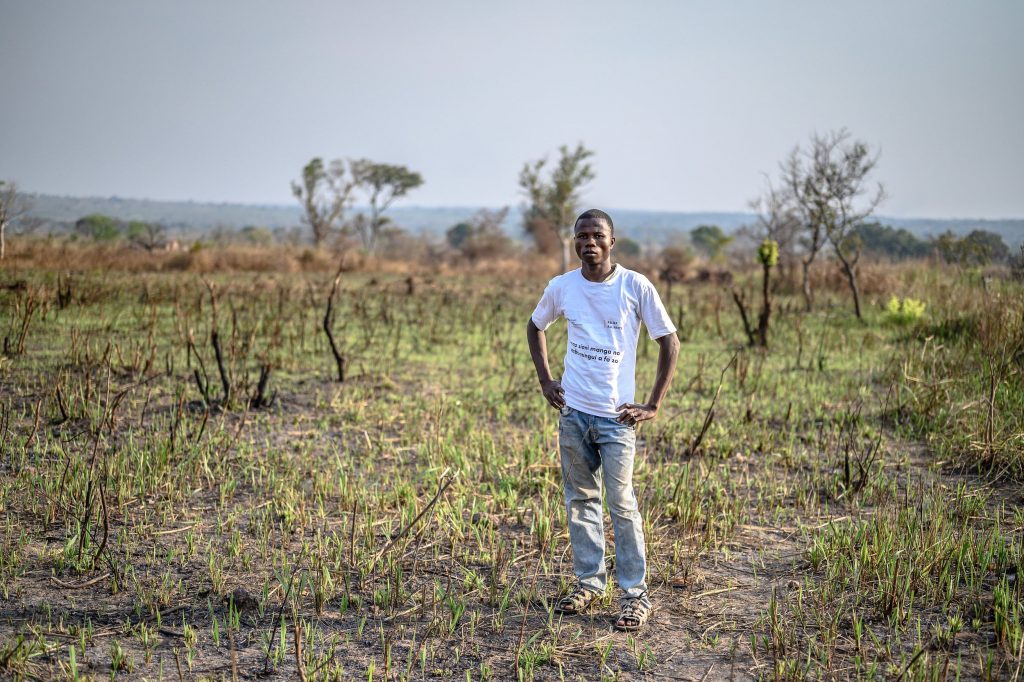
“Before the war, I was just a kid that went to school. Then the fighting started. I was 14. Muslim Seleka rebels shot my parents in front of me and my sisters. I wanted to protect my relatives and avenge my parents and joined a Christian militia. They gave us old guns. We learned to shoot, attack, and hide. When I had to kill people, I thought of my parents. Once the rebels were gone, we went back to our village. For years, my sisters and I survived on what I earned by farming. I felt lonely and sad. My parents’ death and the atrocities haunted me.
Last year I met these people from the child-friendly space. They helped me cope with anxiety and hatred. I also take a carpentry course. The people who offer this training also provide housing and carpentry tools. Somehow, this support gives me hope. It’s a bit like my parents are here again.
I don’t know if I will ever start a family of my own. I don’t have a girlfriend, anyway. But I will improve my life by becoming a carpenter. Everyone needs a bed, a table, and a chair. I can make them.”
Francis Fio (20) – A former child soldier who takes a carpentry course in Bossangoa
“I am 14, but I still go to primary school. Because of the conflict, I didn’t go to school for several years. I love school. Later, I want to become a teacher. My mum died when I was three, so I was raised by my grandmother.
In January 2019, a boy raped me. I told my grandmother. Together we went to the child-friendly space in Zoro. There, they sent me to the Doctors Without Borders hospital. Luckily, I had no disease and I wasn’t pregnant. With the support of the people at the child-friendly space, my grandmother is now pursuing a legal case against the boy who raped me.”
A girl (14) with her grandmother (62) – She goes to the child-friendly space of Zoro, near Bossangoa
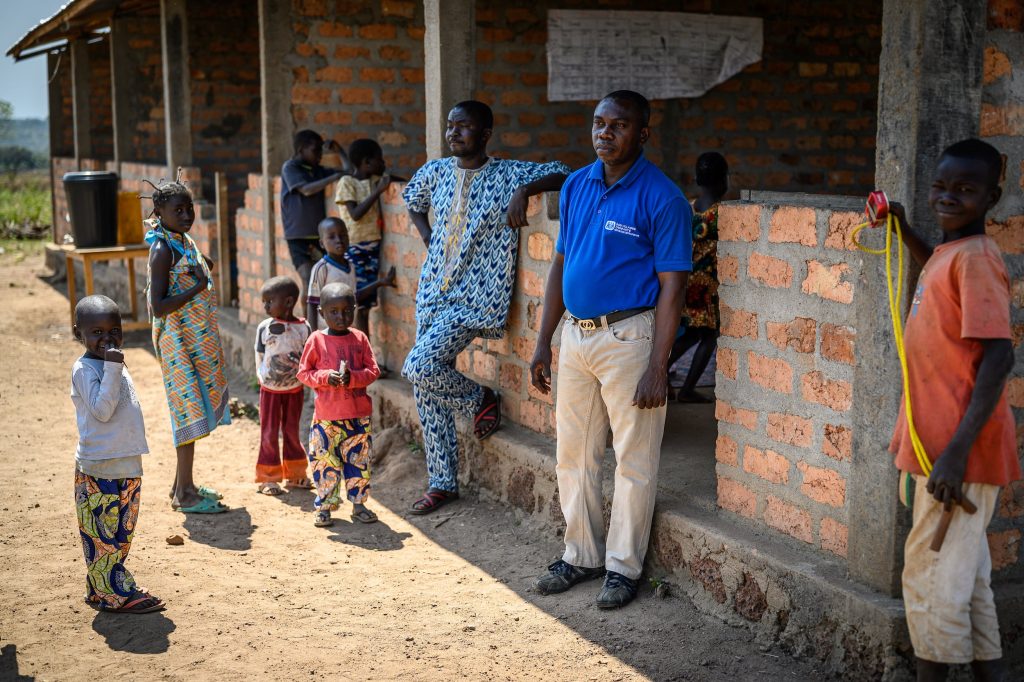
“The kids who come to our child-friendly spaces live five km away at the most. They come by foot, the younger ones assisted by adult caretakers. About half of them are orphans. They all witnessed horrors of war. We have classes for three different age groups, from three years old up to 17.
They come here between regular school hours. This way we make sure they aren’t forced to work. Or don’t run into problems, wandering off all alone. Together we dance, we play games, tell tales, play football, do theatre. Younger kids take extra reading and writing classes, older children are taught languages and arithmetic.
We help them discover their rights, their bodies, dreams, and talents. For young single mothers, girls who are victims of gender-based violence, girls who were forced into marriage, we offer legal assistance as well as psychosocial support.
We offer this kind of protection to 3,000 children and young people, in five different child-friendly spaces.”
Jean Yves Maganda-Belalengbi – Supervises work in child-friendly spaces in the Bossangoa area
“Many houses of Muslim and Christian families were destroyed. This house in the village of Yongo belonged to my uncle. In 2016, rebels attacked him and his family and set fire to the house. His wife was burned alive. My uncle and his three children escaped. They never returned. Every time I walk by the ruins of this house, I think about them. My uncle used to support me. He inspired me to continue my education.
A bit further, there’s the house of the priest of Yongo. It was burnt down. A two-year-old child died. The priest, his wife, and his other children fled to Bossangoa. He wants to come back and rebuild his house, one day. His parents, who founded this village in 1954, are buried in the back yard.
These ruins are sad places. It is even sadder to think that there are many
such ruins, of Muslim and Christian families alike, across the country.”
Kiki (28) – Child protection community worker in Bouca
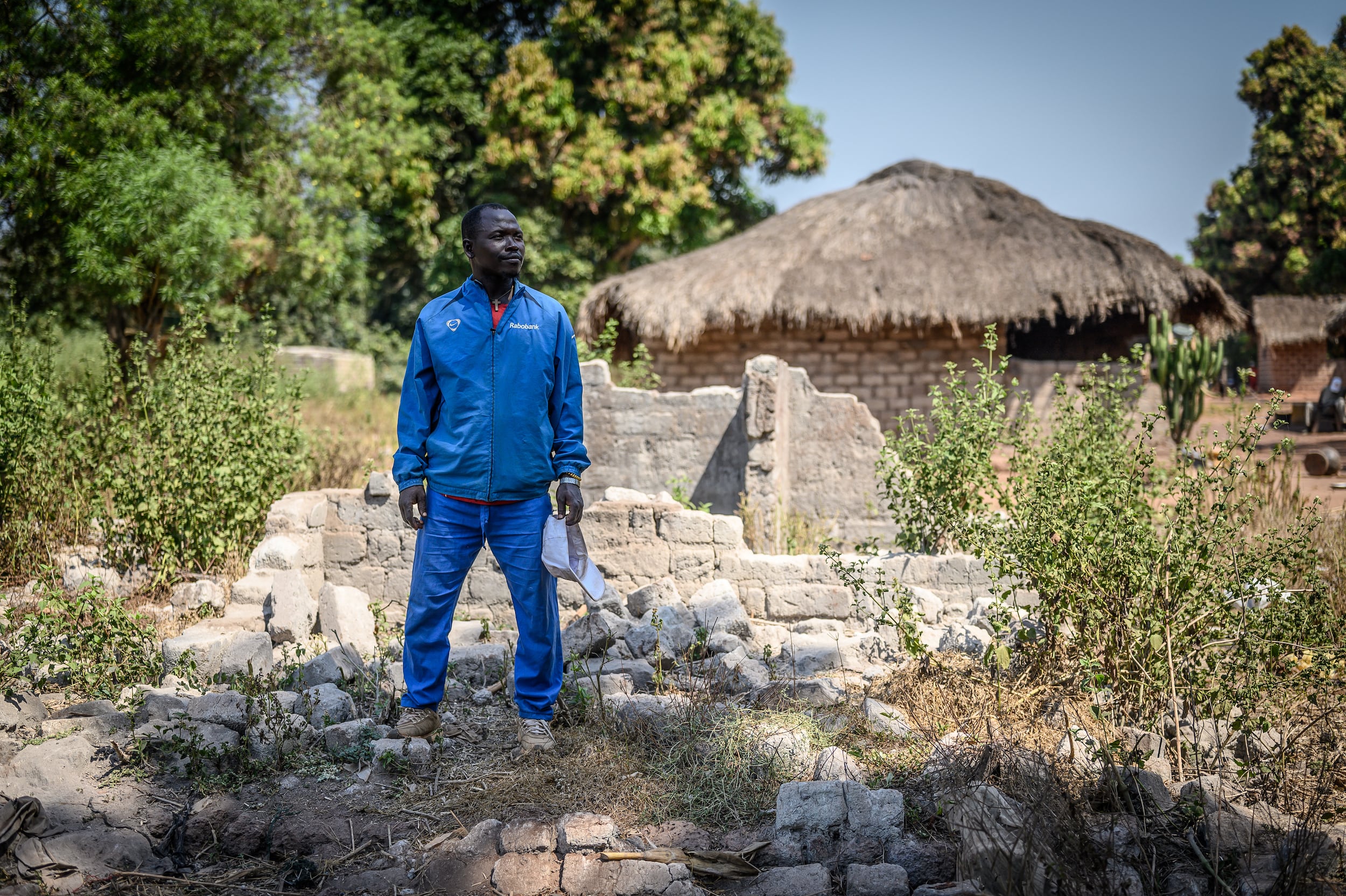

“When the rebels came, we ran to the airstrip. Our parents were killed there. I was eight years old. After the rebels left, we went back to our parents’ house. I was the oldest child. I stopped going to school and started cleaning houses and selling beignets and peanuts on the market. This is how I took care of seven brothers and sisters, for several years. One of them died. One day, a boy followed me. He raped me and left. I got pregnant and gave birth to a boy. It was hard. Now, I am just happy that my child is alive.
Last year, I started going to the child-friendly space of the DRA. I learn a lot, about sexuality, about the rights I have. I also attend a DRA sewing and knitting course. I still clean houses and sell food on the market. But soon, I will finish this training and they will give me what I need to start my own business: a sewing machine and other things. Once I have my own business, I will also prepare for the entrance exam and pick up school where I left it.”
A 14-year-old mother with son and psychosocial care professional Melly Gaëlle Bido – Takes a tailoring course in Bossangoa
“There is this very withdrawn girl. She never played with the others. I started talking to her and bit by bit she told me her story. When she was four, she saw how her mother was killed. She visits our child-friendly space almost every day. We talk a lot. She tells me what it is like to live with her grandmother, and not with her mother. By listening to her, by being with her, playing games together, I try to help her come out of the circle of negative thoughts and feelings. It takes time. But you can see how she opens up.
There is this boy of 12. His dad is depressed and his mother has epileptic fits. He has a hard time coping with that. We talk about it. I listen to him. We also sat with him and his parents. His parents lack even the most basic income to take care of their children. So we decided to give a one-time cash contribution, allowing them to invest in what they needed most. This, with the services we offer at the child-friendly space and the psychosocial support, makes a difference in young peoples’ and families’ lives.”
Melly Gaëlle Bido – Psychosocial care assistant in the child-friendly space of Zoro

“Before the war, there was a school, but it was more like a small hut. Now we are constructing a brick building. During the conflict, there were no teachers. Soon, parents who fled and have now returned, will be teaching our kids, in this new school. I carry stones, sand, and water. It’s hard work, but I do make some money. I get paid more than the minimum wage. It pleases me that I am building the future of my children, who will go to school here. Usually, I work in the field, growing vegetables. This extra job, for a few months, gives me some extra money that will allow me to buy, raise and sell animals.
My husband was a soldier in the army. He was killed in 2005. My father is dead too. I take care of my old mother. I have three children, eight, 11 and 12 years old. They stay in Bouca, at the moment. Once every two weeks, I walk to Bouca, which is 30 km, to visit them and give them what I have. Soon, they will be able to return to Yongo, live with me and go to school here. The force to continue does not come from outside. It comes from within myself.”
Céline (45) – She is part of the workforce that builds a school in Yongo and receives cash support
Diana: “Nobody likes cleaning latrines, but we take turns and we assign others to clean as well. And we do a lot of campaigning at school, discussing the importance of hygiene. What makes me happy, is that these new latrines are safer for girls. We have separate ones for boys and girls and you can close the doors really well.”
Naomi: “Many families fled to Bossangoa during the war. Their kids now go to this school. Like myself. I fled to Bossangoa two years ago. Meanwhile, a lot of teachers haven’t returned yet, because of the instability. That’s why there are too many pupils – about 5000 – but not enough classrooms and not enough teachers.”
Mario: “And not enough latrines. We are happy with the ones they recently built. But we often have to queue. When it takes too long, you just go out in the field to do your business. And honestly, in the rainy season, the latrines tend to become a real mess, because of all the flooding. Keeping them clean takes discipline.”
Naomi: “Especially as the school has no tap water and is not connected to the grid. All these facilities were broken during the war.”
Mario (16), Naomi (17) and Diana (16) – pupils from the Lycée Public in Bossangoa, members of the Club d’Hygiène
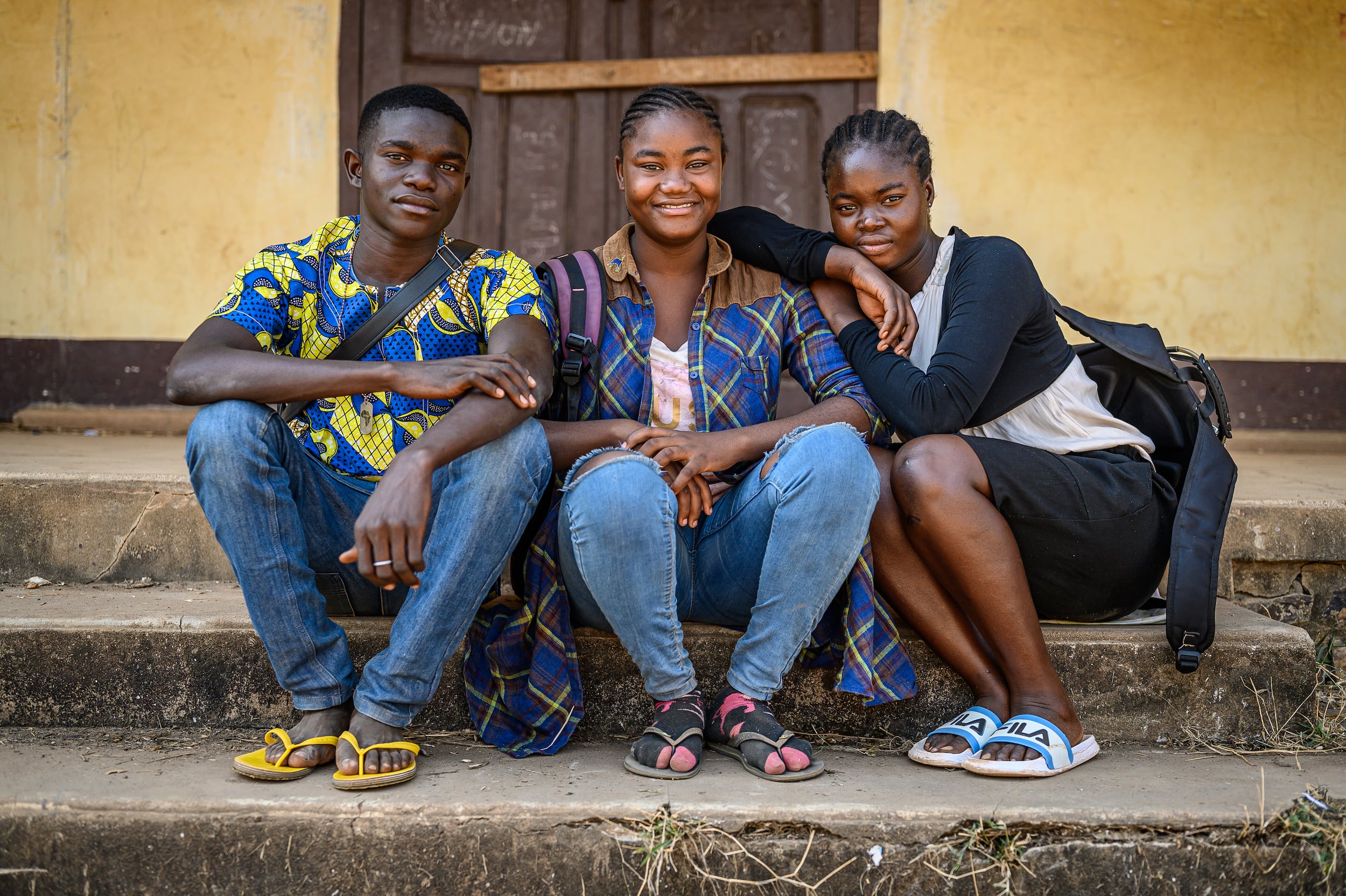
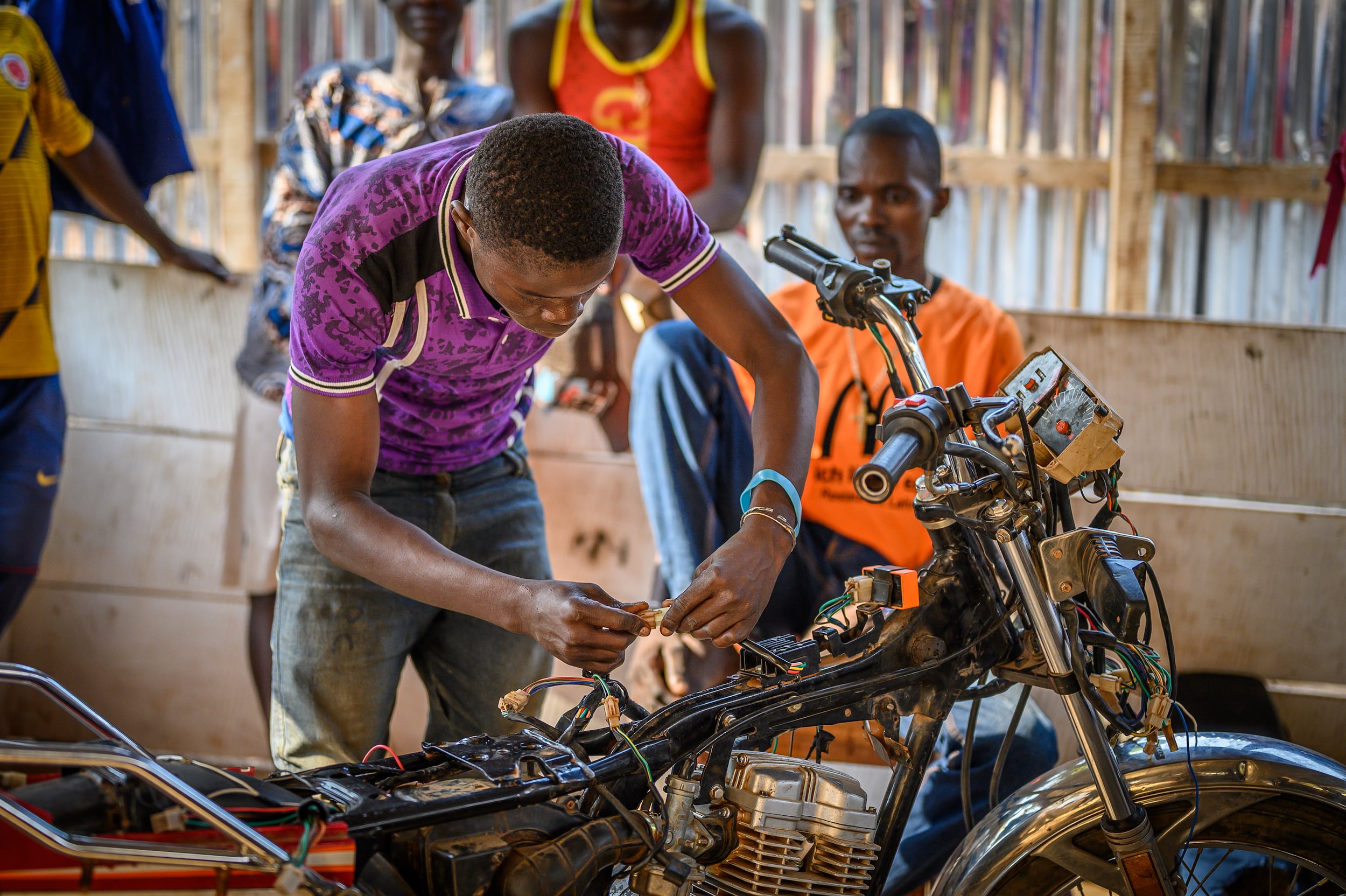
“I love working with engines and motorbikes! I stopped going to school when I was 10. Now, doing this course, I soak up everything I learn. Before, in my village, I had a different life. My dad was killed during the war, by Muslim rebels. I was in the field when it happened. I felt so bad. I wanted to take revenge and joined the Anti-Balaka militias. I was 12. As younger boys, we had to enter villages and find out where the Muslim families lived. We reported back and then attacks were carried out. It felt bad to me. It was wrong. I managed to leave the Anti-Balaka after a year.
The people who invited me to do this course also helped me to talk about my dad, the pain inside and the guilt I felt because of what I had done when I was a child soldier. Now, I can cope better with my feelings and lead a normal life. My dream is to finish this training and become a real mechanic. Later I will hopefully have a wife. And hopefully, she will do the dishes. Because I hate doing the dishes. It’s much harder than repairing motorbikes.”
A former child soldier (17), who takes a course in mechanics in Bouca
“Just knowing that people reach out to us and listen to our story, brightens up my life. Three times I received an amount of 45.000 CFA (68 €). I used it for the school fees of my youngest children, and for food. Some of it I saved. I hope to buy myself a mattress. My husband died long before the war. I have been farming here in Yongo all my life. Now, I am old and weak. My dream is to continue farming, but I hardly have the strength to continue much longer. My oldest son helps me, but mostly I am on my own. Sometimes I dream that other villagers help me in the field. But that is a dream.
I still have eight children. My three youngest still go to school. Two daughters died six years ago when the war started. Sometimes, I forget their names. They were young, four and five years old. They died from diseases and exhaustion when we were hiding in the bush. We have no tombs to remember them. We bury our loved ones in the fields. In the village heavy rains would uncover the bodies.”
Christine Yassi (older than 50) – Farmer in Yongo, receives cash support
Airstrip in Bosssangoa, mainly used for humanitarian flights. When fleeing the violence, a lot of people crossed the airstrip to reach Bossangoa town. Some were killed here.
Women carrying bricks for a new school in Yongo, a hamlet that is slowly recovering from the war. Construction of the school is part of the DRA cash-for-work program.
A glimpse of joy at the child-friendly space of Zoro, near Bossangoa
Listen to Mickael Franci, the photographer and Frank van Lierde, the author sharing their experience while they were on this trip (podcast in Dutch).
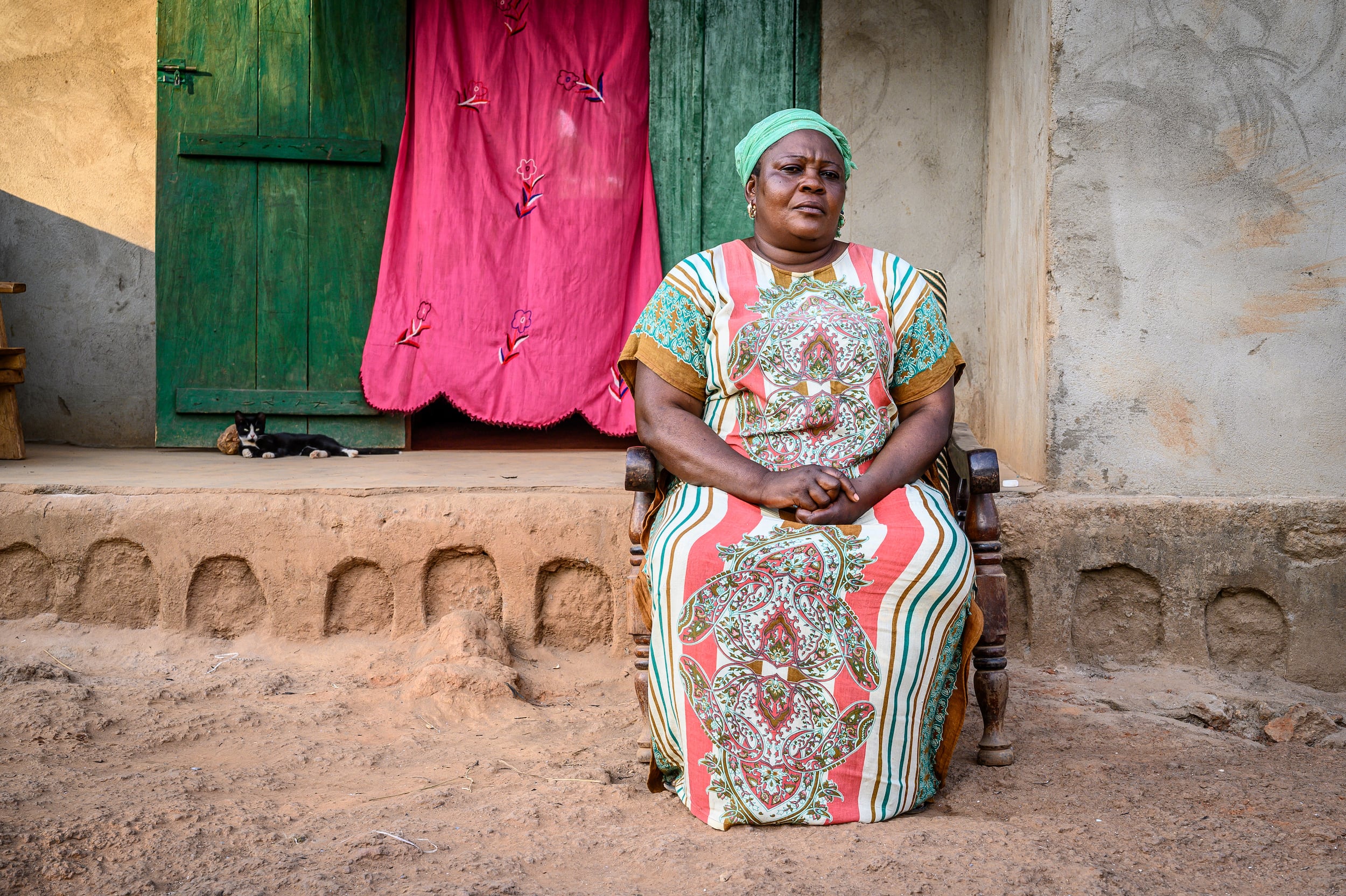
“We fled the violence and lived in the bush for a year, with 12 children. First, we had no food, no water, no money. After a year, we left. This is when my husband was killed in an ambush. We reached a camp for displaced people and stayed there for 18 months. We also lost a grandchild. He was hit by a stray bullet while selling briquettes in the street.
After all this, I rebuilt my home and raised my children by myself. I picked up my life with the support of humanitarians. My younger kids went to their child-friendly spaces. While my kids were educated and assisted, I could work. Twice a week, I also started going to gatherings with other women. We support each other. And we learn, about children’s and girls’ rights. Before, paying school fees wasn’t my priority. Today, it is. I always knew it was wrong that men have all the rights, and women all the duties. But I never learned to speak out. Today, I do.
I feel happy when I am with my children and grandchildren. Their presence fills up the holes in my life, left by the ones who were killed.”
Leonie Lyalingi (around 50) – A widow, mother, and grandmother in Bouca
“We were eating termites when armed cattle drivers attacked us. They raped me and another girl, ran away and we never saw them again. My friend and I got pregnant. In the village, people from the Dutch Relief Alliance offered medical and psychological support. They referred me to the nearest medical centre. This is also where I gave birth. The same people told me I could join one of their courses. Which is what I did. I will soon complete six months of training as a tailor. The other girls here are like sisters. Sometimes they take care of my child so that I can have fun with the others. I love a game called ‘gbagba’, where you let yourself fall backward into the arms of friends.
Doing this training is like entering a new world. It’s the first time I go to school. The first time, after the war, after the abuse, after being pregnant, that I can imagine a future for myself and my child. I have discovered my talents and abilities. I always thought my village was the world. Now I know there is more. There are opportunities and I can grab them. I can stand up for myself. And for my child. Because I love my son.”
Young single mother and her son – Takes a tailoring course in Bouca
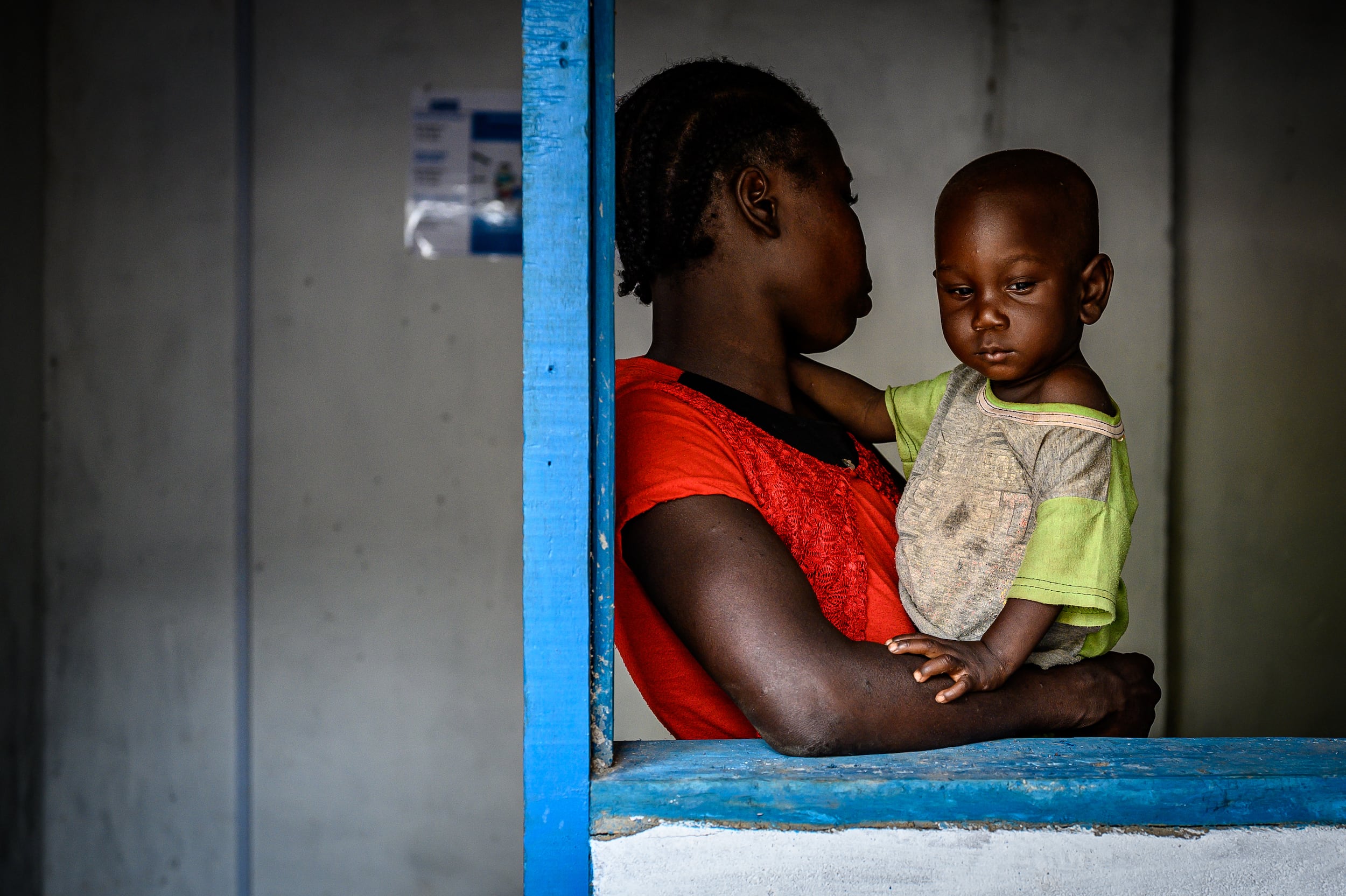
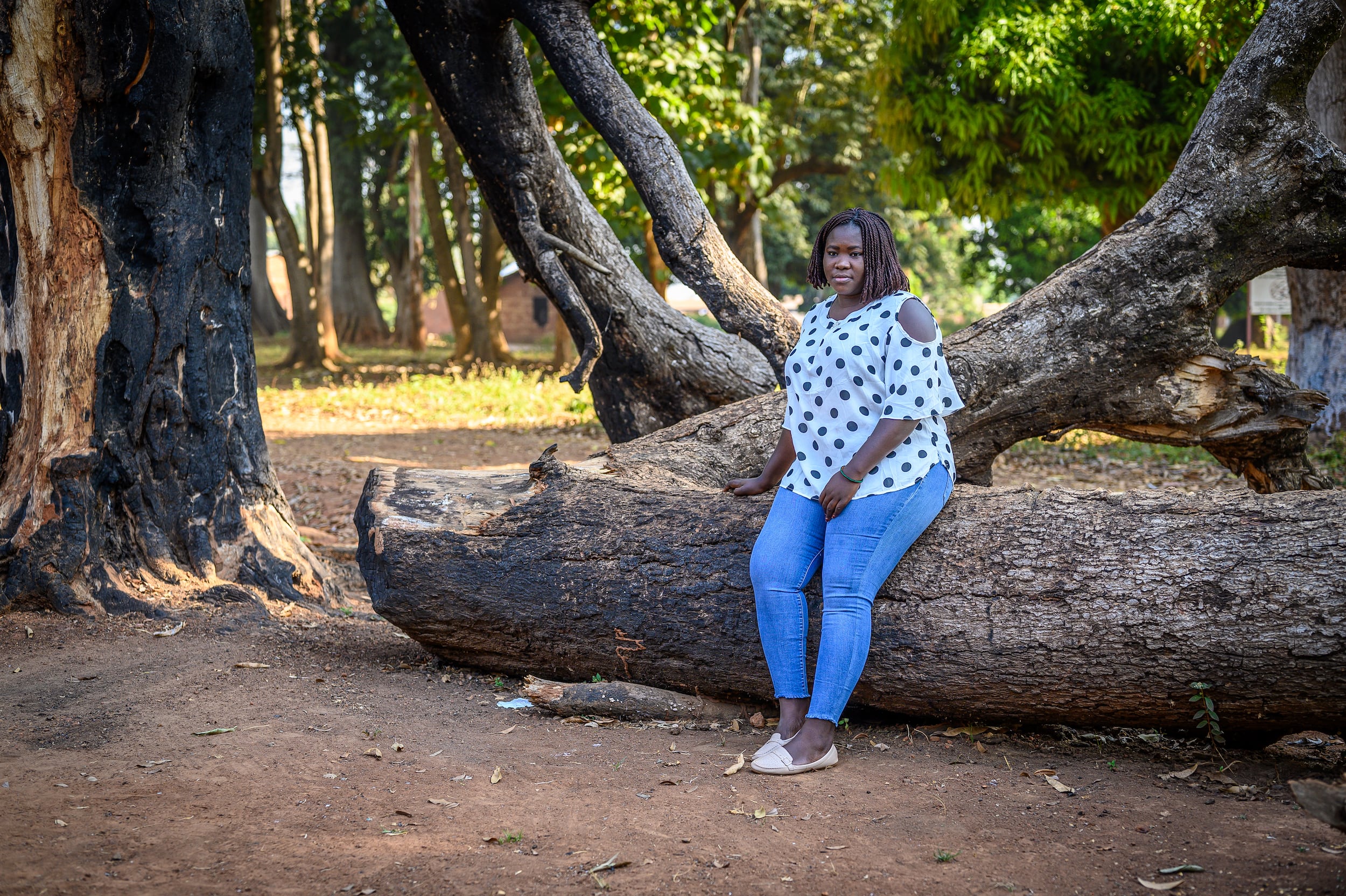
“I work with children who survived atrocities and children who committed them. We start by listening to them, in absolute confidentiality. We don’t check facts or search for the truth, we listen and give them our trust. If we know a girl has been raped, we take her to hospital. They take care of her, check if she is pregnant or infected. We offer her all the forms of support and protection we have, in our training centres, with our psychologists. We check whether we can reach out to her family and be of help to them in supporting and protecting their child.
As a humanitarian, you go where the needs are highest. Often, like here in Bouca, this means you are away from your family. That’s the hardest thing for me. I give all I have to protect children, care for them and give them my love. But I cannot be with my own child. She’s two and a half and lives with my mom. I visit her every couple of months.”
Petula Gapakre – Integrity officer in Bouca

“We do whatever we can to make sure kids go to school. We go from door to door, sit with parents and discuss the importance of education. We convince them to send their children to school, not to the farm fields or the market place. Girls who are the victim of gender-based violence receive individual care. But we also support their families. We cover medical costs and provide financial support allowing them to buy food for their children. As humanitarians, we face many challenges. Sometimes, we get robbed of whatever items we have, food, money, motorbikes. Traffic accidents are common, given the extremely bad condition of the roads. But we want to do what we do. Nothing is more needed and makes more sense than reaching out to children. They are the future.
Everybody here in the Central African Republic, children, grown-ups, aid workers, everybody knows what war is. It makes us realize all the more that we can never do enough. Which is a burden you always carry, as a humanitarian.”
Wilfried Namkoïssé (34) – Child protection worker, based in Bouca
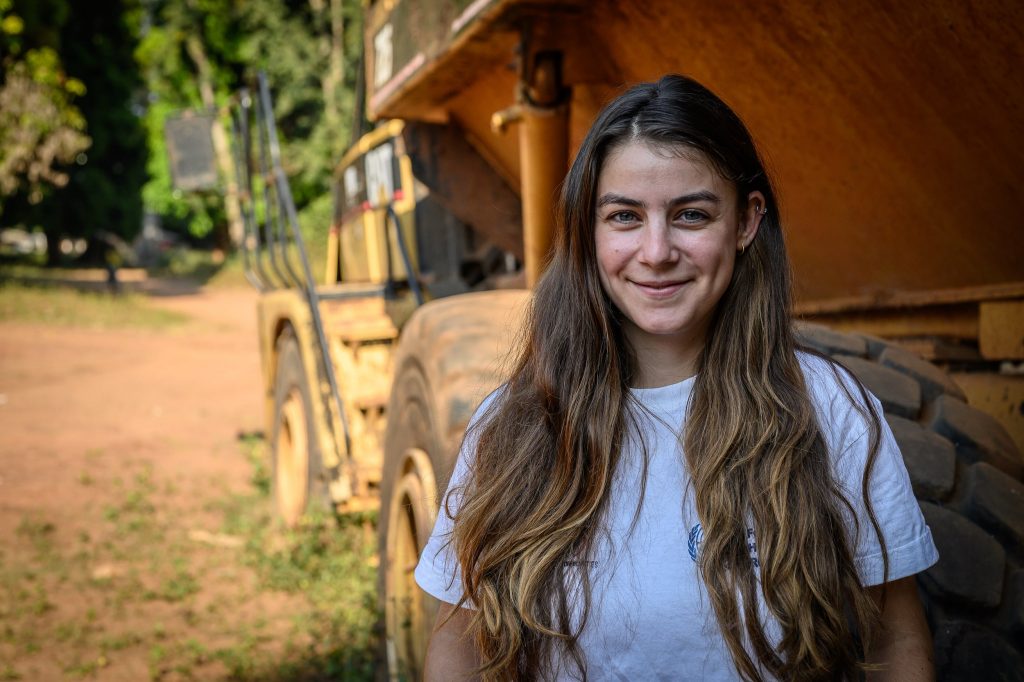
“The past five years, eight Dutch organizations joined hands with Central Africans to respond to one of the world’s biggest humanitarian crises. Last year, I was part of this Joint Response. In two of the most affected provinces, we reached out to kids and grownups who were traumatized by war, displacement, and loss. We provided shelter and food security. We constructed latrines and water points. We handed out cash, for work or unconditionally to those who couldn’t work. For thousands of kids and young people – many of them former soldiers, victims of sexual violence and orphans – we set up child-friendly spaces, organized vocational training and gave psychosocial support. We gain a lot by being an alliance. In some communities, one partner improves food security, while another constructs latrines and sanitation facilities and another provides psychosocial care and protection to children. We strengthen each other’s interventions.
What we do makes a difference in people’s lives. But most of all, Central Africans find the power within themselves to rise again. That’s what inspired me the most. And it humbled me. Humanitarian responses are not only about logistics and security. They’re about compassion and standing with others when they need it most. I hope I can do this for the rest of my working life.”
Elorry Mahou (25) – Field Coordinator of the Joint Response in 2019
Subscribe to our newsletter





